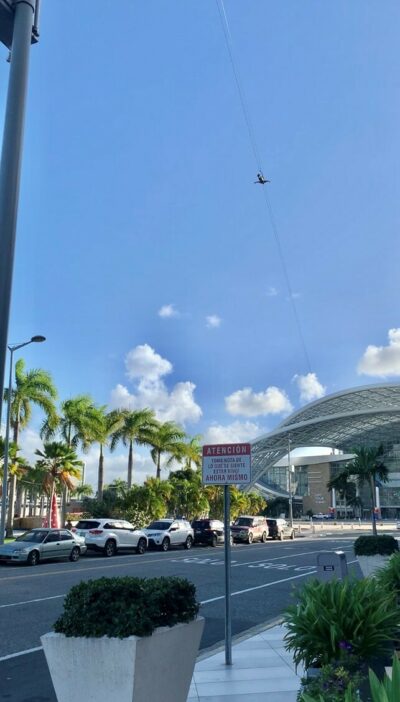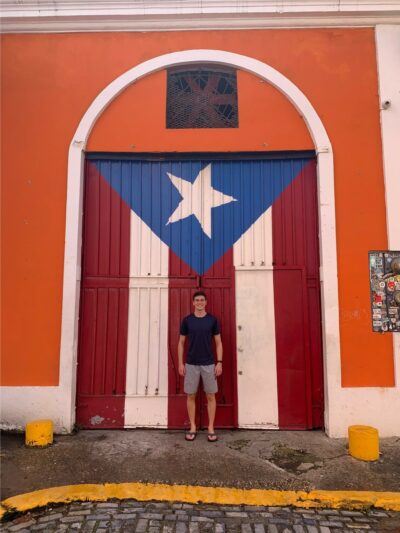5 Questions for a Future Spanish Educator

We’re asking students, recent grads, teachers, and counselors five questions on how languages play a role in shaping personal and professional success…
Meet Patrick—a Loyola University Maryland sophomore from Pennsylvania double majoring in Spanish and Leadership & Organizational Effectiveness.
1. Do you participate in any language or cultural activities outside of the traditional classroom? Tell us about them!
Outside of the classroom, I am part of the Spanish club at my school. I have also participated in a virtual language exchange where we are paired with a student or multiple students from a university in Mexico and have conversations in Spanish and English to improve both of our language skills and learn from each other. Additionally, I had the opportunity in high school to spend a week doing service in Quito, Ecuador, and have been fortunate to visit Puerto Rico twice in the last year, where I was able to put my skills to use.

My junior year of college I am planning on studying abroad for a semester in Alcalá de Henares, Spain, which I am very excited about!
One of the main ways I work on my Spanish comprehension is by watching television shows in Spanish. I just finished watching “Las Chicas del Cable” on Netflix which I absolutely loved, and I’m currently watching “Luis Miguel: La Serie.” Watching television in another language is a great way to build proficiency and learn vocabulary, as well as learn how a language is spoken regionally and colloquially.
Spanish-language music is also my favorite type of music to listen to, and some of my favorite artists are Bad Bunny, Daddy Yankee, and Enrique Iglesias. I highly recommend listening to music in the language you are learning because it is a great way to practice comprehension while at the same time discovering new artists that you love.
Funny story: Last summer when I was in Puerto Rico, I met Daddy Yankee in my hotel and had a conversation with him in Spanish in which I thanked him and told him that listening to his music has actually helped me learn Spanish. When he heard this, he gave me a fist bump.
2. We’d love to know more about what motivates you to become a language teacher? When did you first become interested in this field?
My interest in Spanish education began my freshman year of high school, which was my first year taking Spanish. Early on in the course, I realized that something about the language just clicked for me. I found myself eager to learn more vocabulary and grammar, and looked forward to every class meeting.
I had never had such a strong interest in a subject before, and learning Spanish quickly changed from being a high school requirement to a lifelong passion.
I was fortunate to have amazing teachers who helped me grow in my ability level and gain confidence speaking the language, although I did a lot of work outside of the classroom to teach myself new vocabulary and grammar which was ahead of what was being taught in class.

My sophomore year, I took a service trip with a group of students from my high school to Quito, Ecuador, where we had the opportunity to help teach English classes to students as well as adult literacy classes, meet families in the city who struggled economically, build a house for a family, and tour the city. Through this experience in Ecuador (in addition to being a swim coach), I realized that education was something that I wanted to pursue, and that I could combine my passion for Spanish with my passion for working with students.
What motivates me the most to become a language teacher is the opportunity I would have to change the narrative surrounding languages in the United States and be able to promote diversity and inclusivity in the classroom.
There is a common belief in the United States that English is the global language, and therefore everyone else must adapt to meet our needs and conform to speaking our language. I want to show students the beauty of the diversity of languages and how by learning a language, they are promoting inclusivity and helping to change the narrative in the United States.
3. Have you got a favorite word or expression in another language—what is it, what does it mean in English, and why is it special?

This past January I had the opportunity to spend a week in San Juan, Puerto Rico, on a training trip with my college swim team. One of the days on the trip, I went ziplining at Distrito T-Mobile, and I had my friend take a video of it for me.
When I was leaving, I noticed a street sign on the way out that said, “Atención: Tome nota de lo que se siente estar vivo ahora mismo,” which translates to, “Attention: Take note of what it feels like to be alive right now.”
When I went back and watched the video of myself ziplining, I noticed that the street sign was underneath me and if I paused the video, I could see myself flying through the air with the saying on the sign clearly underneath me.
I absolutely love this phrase because it is a reminder to stop and enjoy things and to live in the moment.
I often look back at that picture of myself ziplining with the sign underneath because it reminds me to always live in the present moment and is a reminder of what the moment felt like when I was ziplining in Puerto Rico.
4. What has most surprised you about learning a language so far?
I am constantly surprised by the diversity of the Spanish language, which is a reflection of the close to 500 million native Spanish speakers in the world. The language has so many regional variations, which is makes it a really beautiful and unique language, although very difficult for someone learning Spanish. It can be a little bit discouraging and overwhelming to try and memorize each country’s unique sets of vocabulary, but at the same time that is what makes the language so interesting.
I also think that the Indigenous American and Arabic influences in Spanish language make it really unique. Because of these differences, I am always surprised by how much more there is to learn in order to master the language.
5. Complete this thought: “Learning another language means…”
Learning another language means taking a step into someone else’s world by going outside of your comfort zone and opening yourself up to seeing someone else’s perspective.

Learning another language requires a certain level of selflessness, vulnerability, and respect because you must be be aware of the fact that a language represents someone’s culture and way of life. Although you are making an effort to learn their language, you must still acknowledge that you are learning from them and their culture, and therefore it is necessary to maintain respect for the native community of that language.
To master a language, you must first make a lot of mistakes along the way in order to learn from them and grow in your knowledge and comfort level. Making mistakes is part of language learning for everyone, and so you must be vulnerable and not afraid to put in the effort and make mistakes. No matter what stage of learning you are at—whether it be at the very beginning of your studies or on the brink of fluency—you are still connecting with another culture in a unique way that can only be experienced through language.
What’s Next?
Patrick is hoping to complement his current studies by adding a potential minor in Latin American & Latino Studies. Looking ahead to the future, he shares:
I would like to become a high school Spanish teacher, with particular interest in teaching upper level Spanish courses and AP/IB courses. I would also like to teach English to speakers of other languages and would love to live/teach abroad. Additionally, I’m considering working in school administration later on in my career.
Check out our Connect with Spanish and Become a Teacher pages to explore language scholarships, university programs, testimonials, and more! And, as always, visit @LangConnectsFdn on social media to share your story with us.
